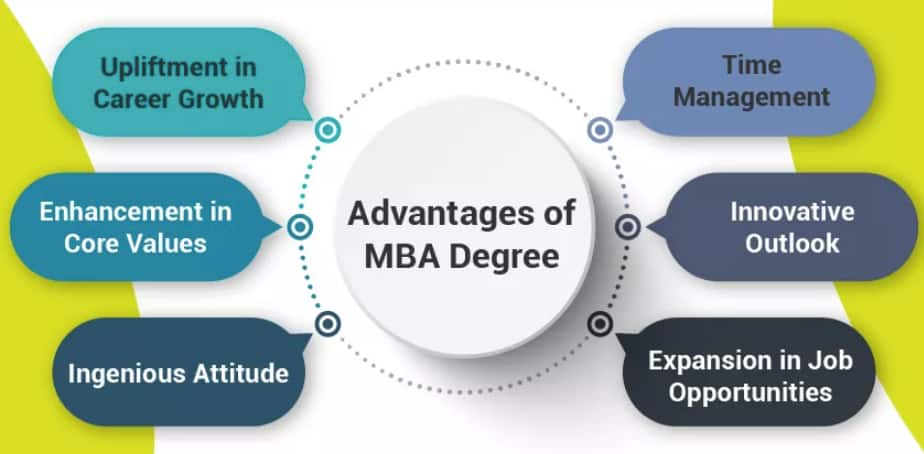RV University, Bangalore | BBA Admissions 2026
Comprehensive 4-year BBA with a 3-year exit option under NEP 2020. Core coverage of Finance, Marketing, Entrepreneurship, Analytics & HR
MBA after B.Tech: Pursuing an MBA after engineering has been trending among graduates for several years. Also, the demand is continuously increasing. After completing the Btech course and gaining a few years of experience, most engineering graduates appear for MBA entrance exams to get a seat in the best institute or course. If you are also planning to pursue MBA after BTech, then read the article to know the advantages of doing an MBA after engineering.
This Story also Contains

Most search queries of engineering graduates are “Should I pursue an MBA after B.Tech?”, “What are the career options after having an MBA and a B.Tech. degree?” Both fresh graduates and experienced engineers who want to excel in their careers seek benefits and processes to pursue an MBA after engineering. MBA after B.tech is one of the most popular career choices for students of all ages. Here we have discussed some of the advantages of pursuing an MBA degree after B.Tech. Experienced people pursue an MBA degree to climb the organizational hierarchy faster.
MBA is referred to as Master of Business Administration. It is a postgraduate professional course of two years. Candidates will learn management skills along with technical knowledge while doing an MBA after Btech. Bachelor degree holders from any stream can opt for this course as their master’s degree programme. Students from any department and also holding a bachelor’s degree in business administration can pick this course as their higher education. People with prior experience in the professional world can pursue an MBA for better future prospects. MBA is a two-year-long course and it could be full-time, part-time also distance education.
Candidates can opt for a full-time course or can enrol in a part-time MBA course to gain the benefit of MBA after Btech course.
Not just pursuing an MBA course is the only key to getting the desired job but also to choosing the appropriate course is important. Having a career objective of managing a team in a company of technicians, then an MBA with Engineering Management specialization can be helpful to the students. MBA in general management or project management is also a good choice if one is planning to do an MBA after B.Tech. An MBA degree in finance, marketing will meet the needs of the candidates who expect to work in a managerial position.
MBA Courses After Engineering
Marketing | Finance & Accounting | Computer Application |
Human Resource Management (HR) | Entrepreneurship | Business Communication |
Information Technology | Economics & Social Sciences | Production & Operations Management |
| International Business | Business Economics | Retail Management |
| Public Policy | Forest Management | Supply Chain Management |
| Telecom | Agriculture & Food Business | Disaster Management |
If an individual is pursuing an MBA after B.Tech then he or she must pursue it from a good institute. Below we are mentioning some of the top MBA institutes.
Read this article: MBA Salary in India
Technology plays an important role in businesses, so students with knowledge of technology and business and finance get the privilege of the business world. Their technical skills can be used by multinational companies as well.
Technical skills are always in trend and without management, no company can run well. Technical and management skills are the core strength of any company. For this reason, a person with these two skills is the best choice that a company could make.
Most of the big companies in the IT sector hire graduates from decent colleges having both a B.Tech. and an MBA degree. Big brands are attracted by these people having two degrees of management and technology.
A degree is not the sole concern to get a good package although having an MBA degree from reputed colleges like IIMs, can provide students higher packages than any other courses. Candidates with both MBA and B.Tech. degrees can crack the aptitude tests easily which helps them to get a better package.
Having both degrees can open a broader career prospect for the candidates. They can pursue any course from any of these two fields.
MBA graduates along with a B.Tech. degree can skip the queue as they mostly start their career at the manager level.
MBA is one of the professional degrees that is recognized all around the globe. The programme of MBA is quite similar in all provinces so the degree of any corner holds a similar importance in the other corner of the world.
MBA can lead people to get managerial posts in organizations, MBA courses include business management, marketing, financial management, and other skills. These skills are much needed for startups. Technical, finance and business management skills are beneficial for entrepreneurs.

To get admission into top MBA colleges, students are required to appear and qualify for the entrance exams. There are many MBA entrance exams held every year and some of the most popular MBA entrance exams are mentioned in the table below.
Applications Deadline - 23rd March 2026 | Offers full-time PGP in International Master in business (IMB) Equivalent to MBA under following specializations Marketing, HR, Operations, and many more
Application Deadline: 10th March | Globally Recognized by AACSB (US) & AMBA (UK) | 17.8 LPA Avg. CTC for PGPM 2025
Engineering with an MBA degree will give a vast array of job prospects along with a high package. Students holding both degrees can get jobs in the private and public sector units (PSUs), banks. They can also work as managers in various sectors. They can be financial analysts too in industries like accounting. Some of the big brands that hire graduates with MBA and B.Tech degrees are:
Amazon
Deloitte
JP Morgan
Microsoft
Morgan Stanley
Cognizant
ICICI Bank
KPMG
Pursuing an MBA after B.Tech. sounds slightly offbeat but students are following this offbeat trend very often. Changing the career path or shifting from the previous stream is okay but students need to be very careful and well aware of the career opportunities and future prospects. If technology and management skills are merged then students can get good jobs with high salary packages, therefore MBA after B.Tech. is a good career option.
The average MBA salary package offered for the B.Tech graduates after their MBA is mentioned below table.
| MBA Job Post | Average salary per annum (Rs in lakh) |
| Marketing Manager | 9 |
| Operations Manager | 7.5 |
| Human Resources Manager | 4-5 |
| Transport & Logistics Manager | 6 |
| Risk Manager | 10 |
IT & Systems Manager | 7-8 |
| 7.5-8.2 | |
| 8-9 | |
Finance Manager | 9-9.5 |
Frequently Asked Questions (FAQs)
An MBA program typically takes 2 years to complete, regardless of whether one has a B.Tech degree or not. However, there are some institutions which offer accelerated or part-time options, which may give students an option to compete the program in a shorter or longer duration, respectively.
Yes, Pursuing an MBA after B.Tech is a good option for the candidates who wish to do business or those who dream about a bright future.
The MBA salary package offered for the B.Tech graduates after their MBA comes to around Rs. 8 LPA to Rs. 24 LPA based on their skills and knowledge.
Yes, if a candidate wishes to widen their career opportunities, then they can consider an MBA after B.Tech degree.
It entirely depends on the person, his or her interest and what type of career goals they are aiming at. However, having that MBA degree will be a huge plus point as it will give the extra edge to a person’s technical abilities.
MBA is difficult in the sense that a student is expected to put in quite a number of hours, a student is expected to work hard. There is no room for complacency.
There are several specialisations for a student who is pursuing an MBA. Some of the popular specialisations are Finance, Marketing, Human Resource, International Business and Operations Management.
On Question asked by student community
There are several government and private colleges in India offering UGC-recognised Online MBA. Some of which are as follows:
Here are some useful article links for more read :
UGC Approved Online MBA Colleges in India 2026: Complete List, Fees,
There are several cheapest online MBA options like:
Visit the links for more details :
Anyone who has completed a bachelor's degree is eligible for Online MBA . For some online MBA courses, especially for Executive MBA, you will require at least 2-3 years of relevant work experience and sometimes a valid CAT, MAT, or GMAT score.
For more, read Online MBA Admission: Eligibility, Selection
Yes, an online MBA degree is UGC-recognised which making it highly relevant in 2026. It holds the same value and credibility as a on-campus programme. Due to its flexible nature, working professionals and graduates prefer an MBA in online, flexible mode to upskill themselves while working.
Hi Priyanka,
Indira Priyadarshini College, Chhindwara doesn't offer MBA courses. The popular course in Indira Priyadarshini College are B.Com, B.Sc, BBA,BA, M.Com and M.Sc.
Ranked among top 10 B-Schools in India by multiple publications | Top Recruiters-Google, MicKinsey, Amazon, BCG & many more.
Among top 100 Universities Globally in the Times Higher Education (THE) Interdisciplinary Science Rankings 2026
Industry Internship Training
NAAC A++ Accredited | Ranked #12 by NIRF
Recognized as Category-1 Deemed to be University by UGC | 41,000 + Alumni Imprints Globally | Students from over 20+ countries
Highest CTC International 23.31 LPA | Highest CTC Domestic 12.5 LPA | Average CTC 7.5 LPA | Avail Merit Based Scholarships